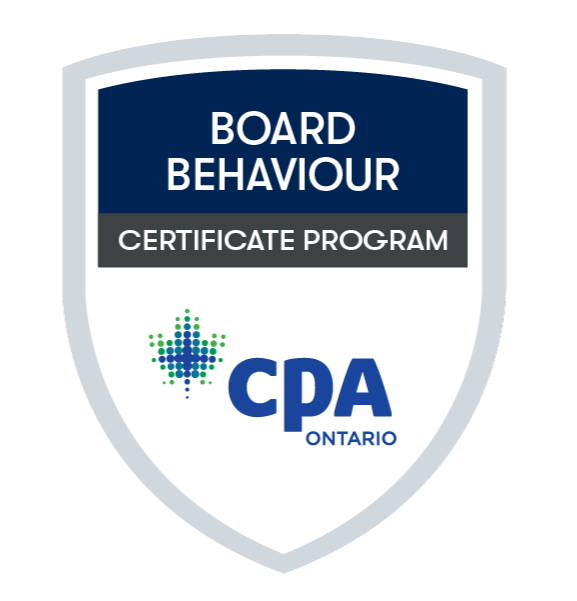Dates and location
Pricing
Hours
Dates and location
Pricing
Hours
Description
Acquiring a Certificate in Board Behavior will strengthen your capacity to effectively carry out your responsibilities within the realm of board interactions, board governance and decision-making processes. It will empower you with enhanced communication skills, improved conflict resolution abilities, and more refined negotiation techniques, ultimately enabling you to excel in your role.
The certificate program explains outlines good governance practices for boards and highlights how board effectiveness is critical to avoid corporate scandals and failures that have taken place across all sectors over the last decade. In this course, learners will learn how to contribute to strong, high-functioning boards whose members trust and challenge one another effectively to deal with critical issues facing the organisation.
BONUS: All members who purchase the Effective Board Behaviour Cert will gain access to a free copy of Karl George’s e-book, the Little Book of Governance.
Click here to access the free preview of the Certificate in Board Behaviour: Update 2024 course.
Topics Include:
| Module | Title | Content |
|---|---|---|
|
1 Theory |
An Introduction to Corporate Governance and Board Dynamics |
PART A – Introduction
PART B – Board Dynamics
Summary Part A is an introductory session describing the workings of the board room; the role of the Chair, CEO, Company Secretary; what papers are expected and how the agenda should reflect and facilitate the board’s oversight role. In Part B, boardroom dynamics explores the different types of collective board behaviour (the poor and the good). The session examines ‘collegiate’ and ‘stretching’ boardrooms and considers the extremes: toxic / conflicting to non-engagement. |
|
2 Theory |
The Board Member |
Summary An exploration of the attributes and requirements of an effective board member and revisiting (in more detail) the roles and responsibilities of board members, particularly the difference between executive and non-executive directors. |
|
3 Theory and Practical |
Board Behaviour |
Summary We consider four types of collective board behaviour based around levels of knowledge and activity: Complacent, Busy Fools, Wilfully Blind, Procrastinating. We then move on to individual boardroom behaviours, considering four types of dysfunctional behaviour with a deep dive into each area, looking at specific examples: Group Think, Conflict, Operational and Passive. |
|
4 Practical |
Responding to Poor Boardroom Behaviour |
Summary Board failures and the types of board – we can now analyse corporate failures based on the methodology of considering: (a) board meeting resources; (b) boardroom dynamics; (c) board member skills; (d) collective board behaviour; and (e) individual board behaviour. We will consider an identification checklist and suggestions for dealing with poor boardroom behaviour. |
|
5 Theory |
The Continuing Role of Corporate Social Responsibility |
Summary We will consider the role of corporate stakeholders (beyond shareholders) and how stakeholder interests are driving the CSR and developing ESG agenda. |
|
6 Practical |
Corporate Governance and Ethics |
Summary We will explore governance through the lens of ethics in the context of corporate disasters, and explain the consequential social and environmental impact. We will consider what ethical decision-making means and the role of EDI. |
|
7 Theory |
What Does it Mean to be a Director? |
Summary We will consider the role of director of a company, where it came from, the meaning of fiduciary duties and what they entail, and the ultimate aims and responsibilities of directorship. We will briefly consider purpose-led businesses and how (if) this changes a director’s role. |
|
8 Practical |
What Makes a Good Board Paper? |
Summary A board is only as good as the information it receives and on which it makes its decisions. Board members should review and challenge the quality of the material they receive. We will consider what the papers sent to the board are intended to do and how the effective board interacts with its executive team to ensure authors/sponsors of board papers are clear about what is expected. |
|
9 Theory and Practical |
Conclusion | Summary module to bring together elements of board behaviour, ethics and decision making by way of Carillion case study. |
Unlock learning anytime, anywhere with the Blackboard Learn app
Seamlessly access your on demand courses, assignments, and get PD hours on the go. Learn how to download now and elevate your education experience with the convenience of mobile learning.
Key Takeaways
This program will:
- Define the concepts of board governance and board dynamics.
- Clarify the competences and skills of the board of directors.
- Identify the four types of collective board behaviour.
- Outline how to respond to poor boardroom behaviour.
- Highlight the continuing role of corporate social responsibility.
- Elucidate corporate disasters from an ethical perspective.
- Outline what it means to be a director.
- Explain what makes a good board paper.
Earn a Digital Badge

Our new collection of digital badges can be earned through the completion of any of our certificate programs offered in our professional development catalogue. Collect these digital badges to add to your website, social profiles, email signature and more. These badges are an easy way to visually communicate your skills and accomplishments to your peers and network. Digital badges will be awarded based on course completion requirements.
Who Will Benefit
The course is designed for aspiring or veteran directors of non-profits, public or private companies, or accounting and finance professionals who wish to serve on boards in the future.
Disclaimer
The views expressed in the course are non-authoritative and have not been formally endorsed by CPA Ontario and do not reflect the views of CPA Ontario. The information included in the course if for general information purposes only.
CPA Ontario, the presenters and the authors do not accept any responsibility or liability that might occur directly or indirectly as a consequence of the use or application of or reliance on this material.
How to Access the Course
We're pleased to invite you to register for our Certificate courses. Whether or not you're a CPA, you're more than welcome to join us on this learning journey. To get started, you'll need to create an account. Don't worry if you don't have a CPA Ontario ID yet; you can easily set up your account right here. Let's begin your learning adventure together.
This is an online session. This course is available 24 hours a day, 7 days a week. Once registered, you can access the material at any time.
However, you will only have access to the course for 90 days after REGISTRATION.
New mobile learning! Download Blackboard Learn from your app store (iOS or Android). Learn more.
To access the course on your computer please visit our BlackBoard site, and log-in using the same login and password used for the Registration Portal.
Please allow up to 15 minutes after registration for the course to appear on your BlackBoard page.
Registration, cancellation, withdrawal and all other CPA Ontario PD policies can be found here.
Speaker(s)
Karl George, MBE, is a thought leader and internationally established consultant in governance. He is a visiting professor with an honorary doctorate, and an established author. He is also a Partner and head of Governance at the leading professional services firm RSM. Karl created The tgf Governance Code, The RACE Equality Code and the Effective Board Member Programmes, and works with boards and senior executives in the private, public and voluntary sectors and has over twenty five years’ combined experience in accountancy, business and strategic development. Karl is a qualified accountant and Fellow of the global international body for governance practitioners ICSA: The Chartered Governance Institute.
